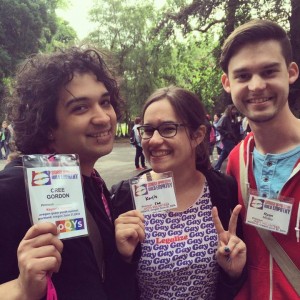When I arrived on a bright Saturday morning to set up Pride Foundation’s table before the Oregon Queer Youth Summit (OQYS) began, I was surprised that a sea of brightly-dressed youth were already milling about, drinking coffee, eating bagels, and eagerly chatting and laughing.
Most of us have a hard time being anywhere at 8am on a Saturday, but their excitement was palpable. They didn’t want to miss a second of this summit—which was clearly important to them. And for good reason—in the style of true youth empowerment, the summit is not only for youth—it is organized and executed by youth.
For the past 11 years, hundreds of queer, trans*, and allied youth from across Oregon come to Portland for one of the most unique and inspiring summits I’ve ever had the pleasure of attending. This year, Pride Foundation had the honor of sponsoring OQYS in building community among youth leaders in Oregon, and I had the opportunity to see first-hand why this event is so incredibly important and fun.
Before I had even set my bag of materials down, attendees came over to talk with me, excited to learn what Pride Foundation was all about. They were even more excited when they learned about our scholarship program, and how it could support their educational goals.
One of our current scholarship recipients stopped by the table and ended up spending a few hours with me, enthusiastically sharing his personal experience applying for a Pride Foundation scholarship with folks who came over to talk to us. I couldn’t help but think that this spontaneous peer to peer teaching and learning is precisely what makes this summit so unique, and so important to those who come year after year.
I was struck by the incredible openness of the youth at OQYS I talked with—within a minute of meeting one person, I found myself in a deep conversation about radical feminism’s exclusion of people with trans* identities, and how as a trans*-identified person this had really impacted his understanding of what feminism meant to him.
Given all the conversations I had with youth who are doing phenomenal work in their communities, I can only hope that every single one of them applies to be a scholar, as they are precisely the type of leaders our scholarship program was created to support and encourage.
Even though the summit took place in an actual school, the days’ offerings of workshops were not something most people would ever have the opportunity to learn about under regular circumstances in that environment. The workshops were curated by youth, and reflected topics that were salient for them—including everything from Drag 101, sexuality, privilege, and queer/trans* science fiction to suicide prevention, addressing discrimination within queer spaces, and managing mental illness.
Particularly near and dear to our hearts was a workshop designed and facilitated by 2014 Pride Foundation Scholar Jose Madrid called “Scholarships for LGBTQ Youth with Intersecting Marginalized Identities,” that helped youth learn more about the different scholarship opportunities that were available to support their educational pursuits.
We think it is wonderful that Jose used his own experience seeking out ways to fund his education to encourage and support other LGBTQ students. This embodies precisely the leadership that Pride Foundation Scholarships value!
Since the conference is for youth, non-youth allies are able to attend most of the workshops, but are asked to remain observers. With this in mind, I decided that it would be most fitting for me to attend the one workshop for non-youth in attendance, on learning to be better allies to youth.
Sitting in what appeared to be a second grade classroom, one of the conference’s youth organizers walked us through interactive role-playing activities to learn how we could be respectful and empowering allies to youth. Much of this involved checking our assumptions that we had to step into caretaker roles when interacting with youth, and instead practicing active listening to determine what, if anything, we needed to do to be an actual support and ally. It felt pleasantly appropriate for a room full of adult allies to spend a portion of our time at OQYS in a classroom learning all we could from these extraordinarily capable youth teachers.
My clear takeaway from this summit was that this is not where queer and trans* youth come to learn how to become engaged leaders—it is where engaged youth leaders come to further develop their already expansive skills, build connections with their peers from across the state, and use their energy to create meaningful social change—and have some fun while they’re at it.
Katie Carter is Pride Foundation’s regional development organizer in Oregon. Email Katie.
